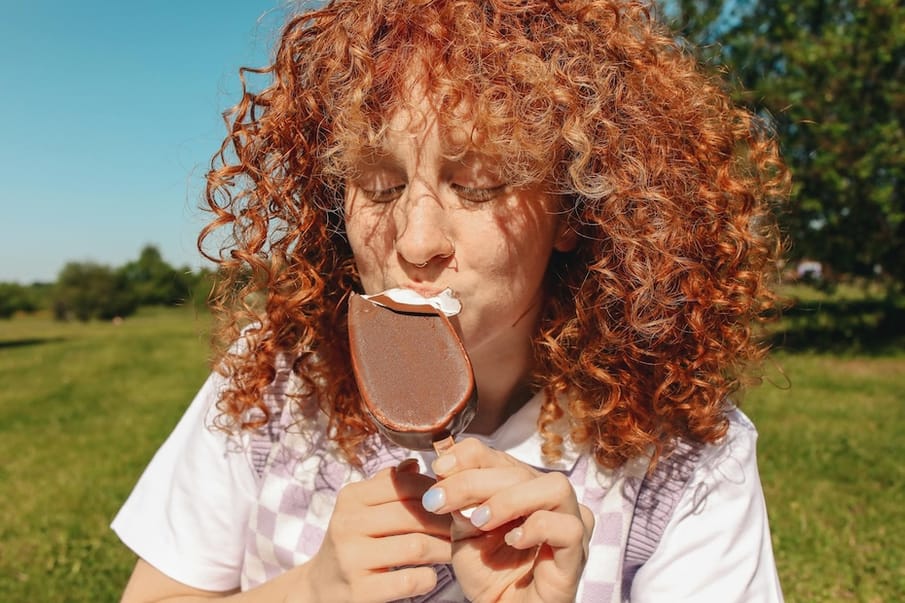Because you deserve it...
Going to my local coffee shop to spend £3.50 on a barista-made latte is a weekly staple in my life that I’m just not willing to give up. Even as my rent, food, and utility bills increase, the world is such an overwhelming place sometimes that low-cost treats that allow me to escape the monotony of daily life are becoming more sacred than ever. Whether it’s an artisan pastry for breakfast, or a bunch of flowers to spruce up your home, treat culture kicked off during the pandemic, and hasn’t ever really left us.
Consumers are known to opt for little luxuries, such as lipsticks and premium snacks, during times of economic downturn, but treat culture is so much more than just spending money to drown out the bad vibes. Embracing treat culture is about doing something for yourself that has a positive impact on your mental health. That’s why a visit to my local cafe (which encourages me to shower and wear something other than pyjamas) is something I know supports my wellbeing and mood during difficult times. But how can we enjoy treat culture mindfully in the middle of a recession?
Some treats are good for you
Treats are associated with rewards for good behaviour, and, as adults who are often lacking in that kind of external validation, giving ourselves a treat can be a way to nurture that inner child, and get a boost of self-love.
Indulging in a little treat isn’t necessarily about the shiny hardback or face mask in question. Instead, it’s about the experience of savouring a moment of respite in between the pressures of modern living, actively choosing to relish the sense of having earned a well-deserved reward, and nourishing your emotional self. In short, it’s all about the act of self-care that the treat represents.
Think about what you actually need
While treats tend to lose their excitement when they fall under the ‘practical’ umbrella, it can be helpful to think about the treats you tend to gravitate towards, and how they serve you. For example, if you like to treat yourself to a fancy coffee, is it because you enjoy the taste, or is it because you’re overworked and lacking sleep? You can still enjoy that wonderful caffeine hit, but reflecting on your core needs might also give you the nudge to work on your sleep hygiene, or book some annual leave to focus on deep rest.
On the other hand, if your little treats are normally triggered by TikTok trends, could you be purchasing out of sheer boredom? It doesn’t mean you can’t indulge in that cute new phone case, but it could be an opportunity to consider whether a coffee date with a friend, or taking up a hobby, would contribute more effectively to your overall sense of fulfilment.
Set yourself a monthly budget
Spending frivolously and passing it off as self-care is not the order of the day here, so take a look at your finances and set yourself a monthly treat budget. If you glance over your bank statements, you’ll probably see that you’re already embracing treat culture with enthusiasm. Take stock of your spending and reflect on those midweek shopping trips: did they boost your mood? If so, you can include those in your budget. How about that Saturday night takeaway? If it made you feel bloated and tired the next day, perhaps it isn’t an ideal future treat option.

Avoid emotional numbing
The key to treating yourself is to make sure that you are using it as a way to increase your sense of fulfilment, not repress difficult emotions. This might mean avoiding treats that serve as a temporary distraction, but have long-term negative consequences on your quality of life (e.g. overindulging in alcohol, or binge-eating sugary foods).
Spend your time wisely
We spend our days rushing from one task to another, which means we often waste money on things that offer convenience over pleasure. But instead of always opting for exchanging cash for a dopamine hit, experiment with spending your time instead. This could be putting your phone on silent and escaping into a nostalgic movie complete with homemade popcorn, or looking up recipes online to slow-cook a delicious meal without any distractions.
Think about the experience
Research shows that purchases that lead to human connection tend to be a guaranteed boost for your mental health, because meaningful social relationships contribute a great deal to our happiness, as shown in a study in the Journal of Consumer Psychology. This might mean that you prioritise treats that involve a social aspect, such as eating in restaurants with friends, or going to see your favourite band play live. Again, it’s about figuring out the specific emotional benefit that the treat delivers, instead of throwing money at your unhappiness.


Comments